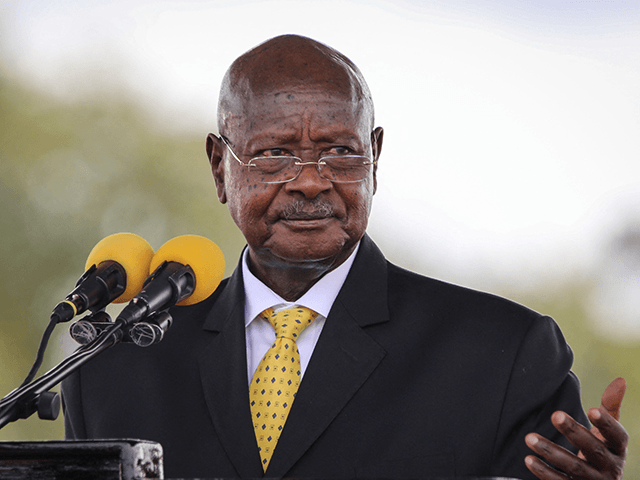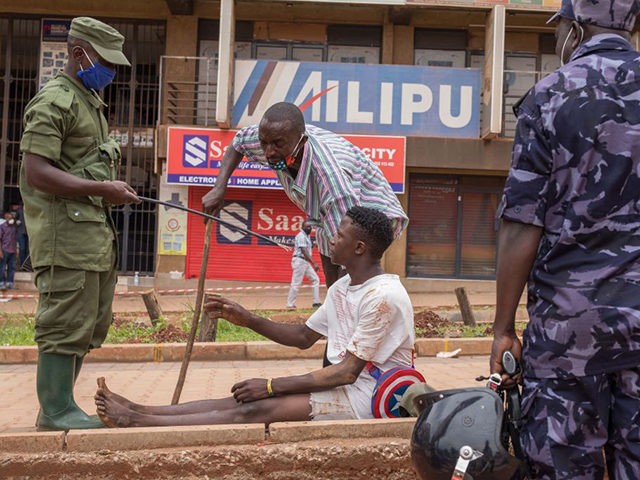Uganda’s parliament passed a bill criminalizing homosexuality on Tuesday with 387 out of 389 legislators voting in favor. The bill stipulates the death penalty for defendants who commit acts of “aggravated homosexuality.”
Same-sex relationships are already illegal in Uganda — and in more than half of African nations — although post-colonial Uganda has never actually convicted anyone for prohibited same-sex activity. The new law would increase the penalties for committing homosexual acts and criminalize “promoting and abetting homosexuality” in addition to actively engaging in it.
The capital offense of “aggravated homosexuality” is defined as same-sex relations with a person “below the age of eighteen years,” or someone who has a “disability.”
Aggravated homosexuality also occurs if the “offender is a person living with HIV,” is a “parent or guardian of the person against whom the offense is committed,” has “authority or control over the person against whom the offense is committed,” uses drugs to “overpower” a victim, or is a “serial offender.”
Reuters noted that one reason the new offense of “aggravated homosexuality” was created was because Uganda has experienced a rash of students who were allegedly “recruited into homosexuality in schools.”
The report said:
This month, authorities arrested a secondary school teacher in the eastern district of Jinja over accusations of “grooming of young girls into unnatural sex practices”.
She was subsequently charged with gross indecency and is in prison awaiting trial.
The police said on Monday they had arrested six people accused of running a network that was “actively involved in the grooming of young boys into acts of sodomy”.
The UK Daily Mail suggested another motivating factor was the schism opened within the Church of England when it voted to bless same-sex unions in February, a decision that enraged many Ugandan Anglicans.
Ugandan Archbishop Stephen Kaziimba called the vote a “crisis” and said the Church of England “has departed from the Anglican faith and are now false teachers.”
The Ugandan bill explicitly states that it was drafted to protect Uganda from “emerging internal and external threats to the traditional heterosexual family” and protect the “cherished culture of the people of Uganda” against “the acts of sexual rights activists seeking to impose their values of sexual promiscuity.”
Activists were understandably quick to denounce the bill. Ugandan activist Frank Mugisha called it a “very extreme and draconian” attempt to “erase the entire existence of any LGBTQ Ugandan.”
Lawyer and activist Sarah Kasande called the bill “barbaric, discriminatory, and unconstitutional,” and warned that it would “strip LGBTIQ individuals of their fundamental rights.”
One of the two members of parliament who opposed the bill, Fox Odoi-Oywelowo, said it was “ill-conceived” and contains “provisions that are unconstitutional.”
Odoi-Oywelowo feared the bill would undo “gains registered in the fight against gender-based violence” and argued that its expanded criminalization of supporting homosexuality “criminalizes individuals instead of conduct.
David Bahati, one of the lawmakers who supported the bill, countered that it was necessary to protect the “sovereignty of our nation.”
“Nobody should blackmail us, nobody should intimidate us,” Bahati said.
Both of the dissenting MPs were from the ruling political party, but President Yoweri Museveniis widely expected to sign the bill into law, although one of the problems with being governed by a mercurial strongman who has clung to power for 36 years is that one never knows exactly what he will do.

Ugandan President Yoweri Museveni speaks during the inauguration ceremony for his sixth term at Kololo Ceremonial Grounds in Kampala, Uganda, on May 12, 2021. (BADRU KATUMBA/AFP via Getty Images)
Museveni took a dim view of homosexuality and railed against foreign activists seeking to impose their values on Uganda in an address to parliament last week.
“The western countries should stop wasting the time of humanity by trying to impose their practices on other people,” he said, echoing the arguments made by the authors of the bill.
On the other hand, the Daily Mail noted that Museveni “has consistently signaled he does not view the issue as a priority, and would prefer to maintain good relations with Western donors and investors.”

COMMENTS
Please let us know if you're having issues with commenting.